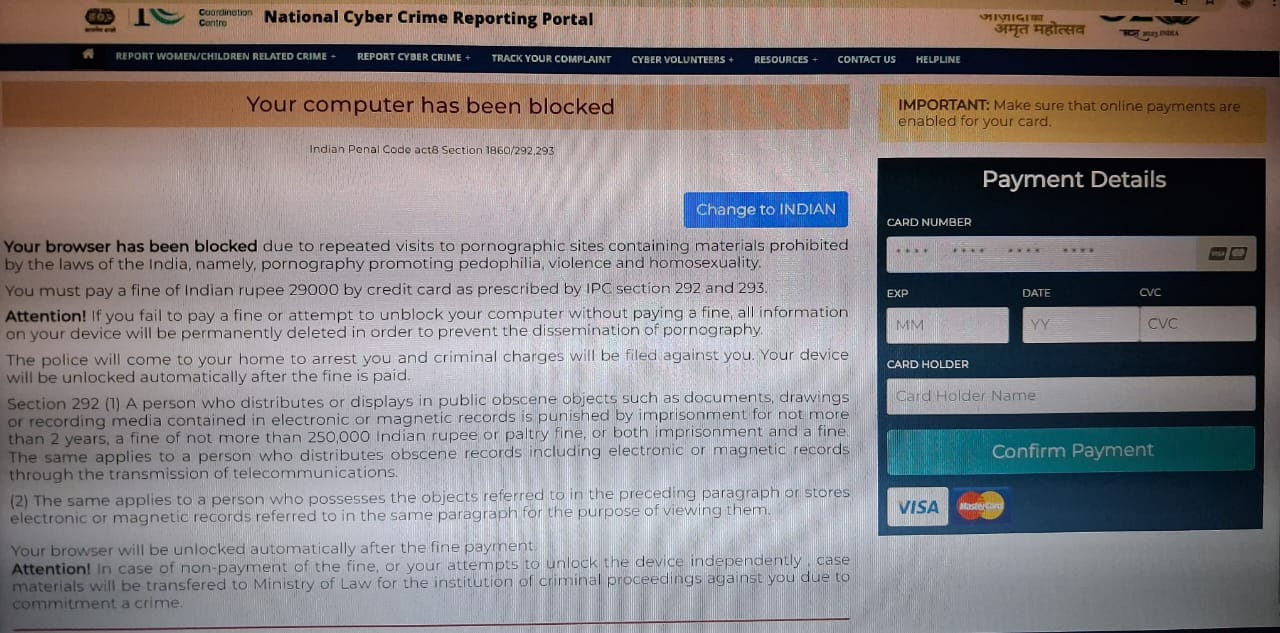Beware of Fake Cyber Crime Warnings: A Deep Dive into Online Extortion Scams/Why Is My Browser Blocked by Indian Cyber Crime Police?
In the age of rapid digitalization, the internet has become a powerful tool for communication, information, and convenience. Unfortunately, it has also become a breeding ground for sophisticated cyber scams. The image shown is a classic example of a ransomware scam page that falsely claims to be from the National Cyber Crime Reporting Portal of India. This scam aims to extort money and sensitive payment information from unsuspecting users through fear and intimidation. Why Is My Browser Blocked by Indian Cyber Crime Police?
Porn Laws in India: What’s Legal, What’s Punishable?
In India, pornographic content is regulated under various laws, primarily the Information Technology Act, 2000 and sections of the Indian Penal Code (IPC) like 292, 293, and 67 of the IT Act. While adult pornography is not explicitly illegal for private viewing, production, distribution, or transmission of obscene or sexually explicit material—especially involving minors—is strictly prohibited. The Indian government regularly blocks websites hosting illegal or obscene content and can prosecute violators under cyber and obscenity laws.
The Scam Explained
The fake warning page informs the user that their computer has been blocked due to visits to “pornographic sites containing materials prohibited by Indian law,” specifically mentioning sensitive and emotionally triggering terms such as pedophilia, violence, and homosexuality. It references Indian Penal Code Sections 292 and 293, giving the message a false sense of legitimacy.
The message then demands a payment of ₹29,000 via credit card to “unblock” the browser and avoid arrest or criminal charges. It uses urgent and threatening language to create panic: stating that the police will arrest the user, data will be deleted, and legal action will follow if the fine is not paid.
To add to the deception, the page includes a professional-looking form asking for credit card details, including card number, expiration date, CVV, and the cardholder’s name.
Signs This Is a Scam
- Unrealistic Legal Threats: Genuine legal notices are not delivered via browser pop-ups and do not demand instant online payments.
- Grammatical Errors: The page contains awkward phrasing and incorrect grammar, such as “change to INDIAN,” which is not something an official site would say.
- Urgency and Fear: It uses fear tactics to rush users into making hasty decisions without verifying facts.
- Request for Sensitive Information: No legitimate government website will ask for your credit card details via a pop-up message.
- Spoofed Branding: Although it mimics the appearance of a legitimate portal, careful observation reveals mismatched fonts, poor design alignment, and suspicious links.
Legal and Technical Perspective
Sections 292 and 293 of the Indian Penal Code do address the distribution and sale of obscene material. However, law enforcement agencies do not take action via browser notifications. Any investigation or notice would be formally issued and delivered in accordance with due process.
Furthermore, browser blocking and threats of arrest are tactics commonly used in ransomware scams or scareware. This isn’t a genuine block imposed by the government; rather, it is likely caused by a malicious script or browser hijacker installed via phishing links or infected downloads.
What You Should Do
- Do Not Enter Any Information: If you see a message like this, immediately close your browser. Do not enter any personal or payment details.
- Scan Your System: Use trusted antivirus or anti-malware software to scan and clean your device. Tools like Malwarebytes, Norton, or Windows Defender can help.
- Clear Browser Data: Sometimes, clearing your browser’s cache, cookies, and history can help remove scripts that reload such pages.
- Update Your Software: Ensure that your operating system, browser, and antivirus are up to date to prevent vulnerabilities.
- Report the Scam: You can report such fake pages to cybercrime.gov.in or local cyber cells.
Final Thoughts
Cybercriminals often prey on fear and shame to manipulate users. It’s important to stay calm, critically assess any threatening messages, and verify through official channels. Scams like the one shown in the image not only attempt to rob you financially but also aim to steal your identity and compromise your security.
Stay vigilant online. Knowledge and caution are your best defenses against cyber threats.
